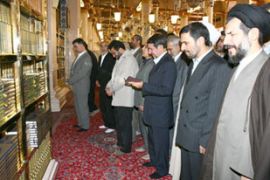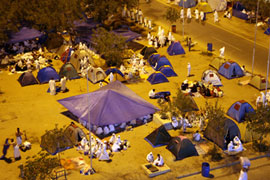Muslim pilgrims begin Hajj
Iranian president joins up to three million worshippers in Saudi Arabia.

An Iranian demonstration during the Hajj in July 1987 led to Tehran and Riyadh breaking off diplomatic relations the following year.
Security forces tried to break up the protest and 402 people, including 275 Iranians, were killed.
Iranian pilgrims then stayed away from the pilgrimage until 1991.
Political dimension
Al Jazeera’s Sami Zeidan in Mina said there was an important political dimension to King Abdullah’s invitation.
“Saudi Arabia is an important key player in the Sunni Muslim world, while Iran is a country that many Shia around the world look to for guidance,” he said.
 |
| On Tuesday, the pilgrims will gather at Mount Arafat [AFP] |
“With the United States putting a lot of pressure on countries to isolate Iran over its nuclear file, the fact that Ahmadinejad is continuing to pick up invitations from countries in this region shows that Gulf countries are thinking twice about how close they want to walk with the United States.”
Saudi authorities say they have made every possible preparation for the Hajj, which Abdullah protects and sponsors in his role as custodian of the two holy mosques.
Previous pilgrimages have seen periodic catastrophes created by the crush of people attempting to perform the religious rites. Last year, 364 people were killed in a stampede a the entrance to the Jamarat Bridge in Mina, from which the stoning of the pillars takes place.
Flow of people
The government has also it will crack down on pilgrim squatters who cause overcrowding and has taken precautions against bird flu, after recent cases where the deadly H5N1 strain of the virus killed birds in the Riyadh area.
The pilgrimage, which ends on Friday, is one of the five pillars of Islam and is an obligation for all able-bodied Muslims at least once during their lives if they can afford it.